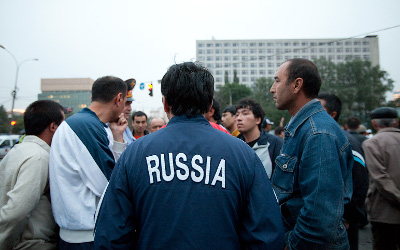AKIPRESS.COM -  A group of Russian lawyers is preparing an appeal to the Council of Europe to seek a ban on Russia’s illegal extraditions of Uzbek refugees back to their homeland, UzNews reports.
A group of Russian lawyers is preparing an appeal to the Council of Europe to seek a ban on Russia’s illegal extraditions of Uzbek refugees back to their homeland, UzNews reports.
Uzbek activists and refugees living in Russia live in danger. At any point an Uzbek national can be captured by their country’s National Security Services and driven back home in the trunk of a car or under a false name.
Illarion Vasiliev, one of the lawyers preparing the Council of Europe appeal, had a client kidnapped. Mirsobir Khamidkariyev, a former producer living in exile in Moscow, who was trying to escape false allegations of associating with banned religious organizations in his native Uzbekistan, was kidnapped from a taxi on June 9 while his wife was buying medicine for their newborn son. Before the kidnapping, Khamidkariyev had noticed that he was being followed by a car with Asian-looking men inside.
“Seven people have been kidnapped since December 2013. They are activists, people who had been accused of being part of extremist organizations at home. We are currently preparing a statement to the Council of Europe, a body that oversees implementation of European court decisions.
The European court can put a halt to illegal extraditions of Uzbek citizens back to their country. We are asking not for any one individual case but for a general ban on the extradition from Russia to Uzbekistan. Everybody who has been extradited immediately ends up at a prison in Tashkent,” says Vasiliev.
As a rule, Uzbek nationals living in exile in Russia are tracked by their cellphones.
“My clients complain often about being followed. They manage to temporary shake off their pursuers by changing their SIM cards but soon enough they are discovered again. I have suspicions that Russian security services are assisting their Uzbek counterparts in this,” claims Vasiliev.
Why might the Russian security services be willing to entangle themselves in these kidnappings and extradition cases?
“It’s not a secret that Putin came into his full power on the wave of an anti-terrorism campaign,” says Vasiliev. “He and Karimov speak the same language when it comes to this issue. Russia obliged a request by Tashkent to place an organization like Hizb ut-Tahrir on its extremist list. Many people inside special services have received their medals and got their budgets for anti-terrorism activities.”
“It’s easier to find a disenfranchised Uzbek at a construction site in Moscow than in the mountains of Dagestan,” says Vasiliev. Besides, the formal extradition procedure is very lengthy with frequent delays imposed by the attorney general. Kidnapping on the other hand is quick and effective, says Vasiliev.
Illarion Vasiliev believes that every Uzbek citizen currently living in Russia is in danger of something similar happening to them.
“This is a form of control by the Uzbek Government. The Uzbeks who come to Russia to work realize soon enough that they have rights, unlike back at home. Yet when they go back they need to follow the Uzbek rules again and bow down to every official. And they obviously do not want to do that any more. That is why the Uzbek regime has seemingly come up with this system: you have lived in Russia for three years? If so, you should come back home, calm down, spend some time in prison … fake criminal cases are opened all the time.”
Furthermore, these kidnappings have become a way to make a good living for the operatives from both countries. An illegal extradition of one person fetches 10-15 thousand USD.
Meantime in Uzbekistan there is a campaign to get Uzbek migrant workers to come back home. Makhallya committee chairs and other officials go from house to house trying to convince migrant’s relatives to get them to come back. Hamroev says that is seems that the Uzbek Government is paranoid that a large group of Uzbek citizen in Russia are getting ready to overthrow Karimov.
